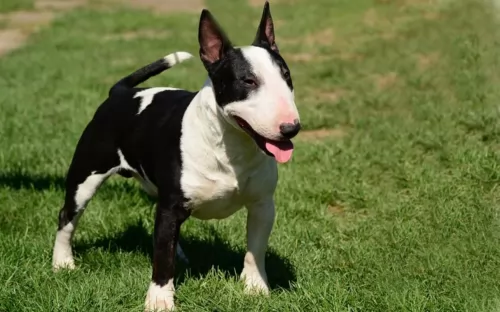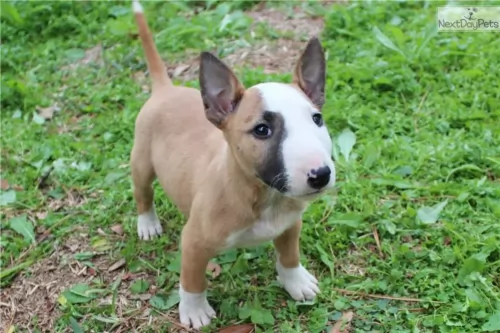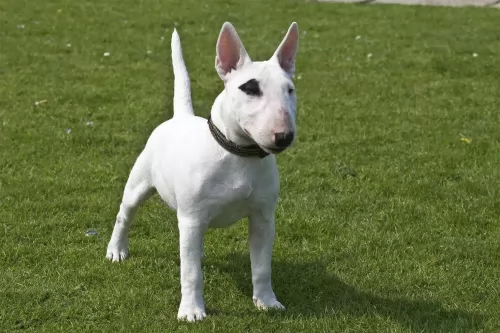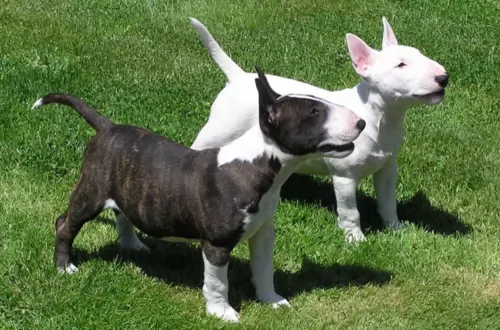 Petzlover
Petzlover Bull Terrier Miniature is originated from United Kingdom but Samoyed is originated from Russia. Bull Terrier Miniature may grow 27 cm / 10 inches shorter than Samoyed. Bull Terrier Miniature may weigh 15 kg / 33 pounds lesser than Samoyed. Both Bull Terrier Miniature and Samoyed has same life span. Both Bull Terrier Miniature and Samoyed has almost same litter size. Bull Terrier Miniature requires Low Maintenance. But Samoyed requires Moderate Maintenance
Bull Terrier Miniature is originated from United Kingdom but Samoyed is originated from Russia. Bull Terrier Miniature may grow 27 cm / 10 inches shorter than Samoyed. Bull Terrier Miniature may weigh 15 kg / 33 pounds lesser than Samoyed. Both Bull Terrier Miniature and Samoyed has same life span. Both Bull Terrier Miniature and Samoyed has almost same litter size. Bull Terrier Miniature requires Low Maintenance. But Samoyed requires Moderate Maintenance
 Less well known than the Bull Terrier, the Miniature Bull Terrier which actually follows the same breed standard, has a height of 35cm. The Bull Terrier and Miniature are classified as the same breed. The weight of the smaller Miniature is only about 15kg.
Less well known than the Bull Terrier, the Miniature Bull Terrier which actually follows the same breed standard, has a height of 35cm. The Bull Terrier and Miniature are classified as the same breed. The weight of the smaller Miniature is only about 15kg.
It was in the early 1800s that the Miniature Bull Terrier was developed, descending from the English Bulldog as well as the White English Terrier which is now extinct. This blend produced the Bull and Terrier, which was later shortened to the Bull Terrier. They came in a number of colors such as pure white, white and tan as well as white-and-black-patched or tri-colored.
Breed fanciers wanted a compact dog which looked much the same as the larger Bull Terrier. It was in 1938 that Colonel Glyn founded the Miniature Bull Terrier Club in England and the Miniature Bull Terrier Club of America was formed in 1966.
 The Samoyed is a large breed of dog; a spitz-type dog, with a thick, double-layer coat. The dog was used to help with herding and to also haul sledges for the Siberian Samoyede people.
The Samoyed is a large breed of dog; a spitz-type dog, with a thick, double-layer coat. The dog was used to help with herding and to also haul sledges for the Siberian Samoyede people.
The Samoyed has been used in polar expeditions, including Sir Ernest Shackleton's journey to the Antarctic. They’ve put up with a lot of hardships on these journeys and some of them have lost their lives on these expeditions.
The first standard for the breed was adopted in England in 1909, and in 1923 the original Samoyed Club of America was established.
 Miniature Bull Terriers, just like the regular Bull Terriers have short, glossy coats and these coats can be white, tan, brindle or tri-color such as black, tan and white. This is a muscular little dog, with the same very distinctive egg-shaped head and small, closely-set dark eyes and erect ears. The medium length tail is carried horizontally.
Miniature Bull Terriers, just like the regular Bull Terriers have short, glossy coats and these coats can be white, tan, brindle or tri-color such as black, tan and white. This is a muscular little dog, with the same very distinctive egg-shaped head and small, closely-set dark eyes and erect ears. The medium length tail is carried horizontally.
The Miniature Bull Terrier isn’t particularly good with small children, but he still makes a good companion for people, whether he lives in the city or the country. In fact, this smaller breed Bull Terrier makes a great pet for people with smaller spaces, and like the Bull Terrier, he is a loving, devoted pet. He has an entertaining personality, is playful and energetic, making him a good watch dog.
However, even though he is small, he is always more than ready to take on any larger pets and therefore isn’t considered the greatest pet to have if you have other animals in the house. However, with excellent training and socialization, this handicap can be overcome.
 The Samoyed is a large herding dog standing at between 48 to 60cm in height and weighing 16 – 30kg. He has a thick, double layer coat that is silvery white.
The Samoyed is a large herding dog standing at between 48 to 60cm in height and weighing 16 – 30kg. He has a thick, double layer coat that is silvery white.
The top layer is fairly long and coarse. The dog sheds heavily once or twice a year, but the dog is described as being hypoallergenic.
The ears of the dog are typical spitz-like – erect. The eyes of the dog are almond in shape and while they are usually brown, they can sometimes be blue too. The tail is long and curls over the dog’s back. When these dogs sleep in the snow, you might notice the tail is folded so that it covers the dog’s nose.
The Samoyed is a friendly dog, to such an extent that you wouldn’t call him a good watchdog. They’re friendly dogs with happy expressions on their faces. They make great family pets and will get on well with children as well as other dogs in the home.
Like all dogs, the Samoyed will need early training and socialization to make him obedient and well rounded. He is intelligent and can easily learn a few basic commands.
 The attractive Miniature Bull Terrier is just a small version of the regular Bull Terrier, and many people are drawn to them because they have all the spunk of the larger breed but are easier to manage. He is such an entertaining little dog and guarantees to make an excellent family companion. He is just longing to be involved in every family activity happening around him.
The attractive Miniature Bull Terrier is just a small version of the regular Bull Terrier, and many people are drawn to them because they have all the spunk of the larger breed but are easier to manage. He is such an entertaining little dog and guarantees to make an excellent family companion. He is just longing to be involved in every family activity happening around him.
He becomes attached to his human family, but this deep bond between him and his family can lead to separation anxiety. Never leave him alone day after day in the backyard. You wouldn’t to that to one of your children, and he is a family member, albeit a 4-legged one.
Just like the standard Bull Terrier, the Miniature Bull Terrier is going to need firm training from a young age. Then he becomes an exceptional pet as he understand the boundaries in your particular home.
 The Samoyed is a gentle, easy going dog that gets on well with everyone, loving children and being prepared to be friendly towards other dogs too.
The Samoyed is a gentle, easy going dog that gets on well with everyone, loving children and being prepared to be friendly towards other dogs too.
His friendliness makes it that he doesn’t make a good watchdog. He is intelligent and can be trained to obey basic commands.
He loves plenty of exercise, after all he has always been a working dog. Apart from the coat which will require quite a bit of upkeep, the Samoyed is prepared to come into your home and make you a splendid pet and companion.
 The Miniature Bull Terrier can live to be 10 to 12 years of age. Their most serious health issue is blindness which is caused by lens dislocation, showing up more or less after 3 years of age. With the white dogs, other breed health concerns can include congenital deafness and compulsive tail chasing.
The Miniature Bull Terrier can live to be 10 to 12 years of age. Their most serious health issue is blindness which is caused by lens dislocation, showing up more or less after 3 years of age. With the white dogs, other breed health concerns can include congenital deafness and compulsive tail chasing.
Some Bull Terriers develop a compulsive neurologic disorder where the dog turns round and round chasing his tail. As soon as you see this, try and distract him with an exciting game, because allowed to develop, it’s a habit that can become difficult to control.
This is a common problem with dogs and you need to watch that tartar build-up on the teeth which can lead to infection of the gums. Brush your pet’s teeth with special dog toothpaste and toothbrush 2 or 3 times a week so that he doesn’t lose any teeth. Bad teeth can affect other organs such as the kidneys and heart.
 Dogs can get diabetes just like people can. Diabetes is becoming more common in dogs as people try and feed their dogs ‘treats’ such as chocolates, biscuits and ice-cream.
Dogs can get diabetes just like people can. Diabetes is becoming more common in dogs as people try and feed their dogs ‘treats’ such as chocolates, biscuits and ice-cream.
Fortunately diabetes is manageable. Certainly, if you discover signs of diabetes in your pet, get him to the vet. The typical symptoms of diabetes in dogs are increased urination, increased thirst and weight loss. Cataracts and blindness can also occur.
Glaucoma is when there is increased pressure in the eye. It can be hereditary or secondary where there is decreased fluid in the eye because of other eye diseases. Symptoms include pain and even vision loss. It can be treated surgically or with eye drops.
This is an inherited condition in dogs where the thighbone doesn't fit properly into the hip joint. Some dogs will even have lameness in both rear legs. The vet will want x-rays to diagnose hip dysplasia. Unfortunately arthritis can also develop.
 With his short, smooth coat, the Miniature Bull Terriers requires little grooming. He’ll need a good brush down twice a week to remove loose hairs.
With his short, smooth coat, the Miniature Bull Terriers requires little grooming. He’ll need a good brush down twice a week to remove loose hairs.
This is one of the best things you can do for your Bull Terrier if you don’t want them having puppies. Spaying or neutering decreases the likelihood of certain types of cancers too.
Keep your dog’s diet consistent, varying between a top quality commercial produced dog food appropriate to his age. You can include home-made meat, vegetables and rice and some raw meat every now and then. Never feed him human-food such as peanuts, crisps and chocolate. Always have fresh, cool water available night and day.
 The coat of the dog is super thick and in the Spring, the dog sheds a lot. Samoyed dog owners will need to be regular with their brushing routine with these dogs as the coat can easily tangle. Some people just prefer to get their Samoyed to a professional groomer.
The coat of the dog is super thick and in the Spring, the dog sheds a lot. Samoyed dog owners will need to be regular with their brushing routine with these dogs as the coat can easily tangle. Some people just prefer to get their Samoyed to a professional groomer.
This is a working dog, used to working hard in all kinds of conditions. He doesn’t take kindly to being bored with nothing to do and he howls and barks till you take him on a walk. He requires regular exercise such as hiking, ball games, running and swimming. It is why this dog isn’t suited to life on a small property in the city. He requires a large garden or farm and lots of exercise.
If you want your Samoyed to be healthy so that you’re not constantly at the vet, provide him with top quality food. It is always useful and convenient having commercially manufactured food but you want to vary the diet just a bit by providing some homemade food too.
If you boil chicken, brown rice or pasta and spinach, sweet potatoes and carrots in a pot you can chop it all up and freeze it and feed portions twice a week to your dog. Warmed up it can be added to his dry kibble and be a wonderful tasty treat for him. Every now and then you can also include some raw meat which can be beneficial for his skin. Ensure there is always a bowl of fresh, cool water within his reach.